This past week I spent numerous hours, with the help of a friend, packing up things in my office at Assumption and moving them to St. Angela. I was impressed by how much I had acquired during my five years here in Windsor. I came from Edmonton with everything packed into my car, plus two large suitcases sent earlier. Now, little by little (from gifts or purchases or the result of meetings, etc.) I have accumulated more: books, papers, clothes, nick-knacks, etc. Some of these things have sentimental value; others just kind of ended up in a drawer or on a shelf or whatever, and ended up at St. Vincent de Paul or in a recycle bin. I moved some things to my bedroom, which remains at Assumption.
This weekend I am conscious of all my “possessions” as the Church celebrates the 106th World Day of Migrants and Refugees. This year Pope Francis chose “Forced like Jesus Christ to flee” as the theme. Bishop Fabbro writes about the stories we have learned from refugees and migrants served by the Diocese of London:
We have learned through their stories that they have come to our country because they were forced, like Jesus, to flee, to find safety for themselves and their loved ones (Mt 2:13). Their lives were turned upside down because of war or political unrest or poverty or environmental degradation, and they had to seek a new home. Some had to leave their country to earn a living, so that they could send support back home to their families. Their stories, in fact, echo the stories of our ancestors who came to Canada in search of a new way of life, a way to support their loved ones. (Letter of 22 September 2020)
I am reminded of how many people flee their homes, their cities, their cultures, everything they know, in search of safety or a better life. They often leave with little more than the clothes on their backs. Some of you reading these words will have experienced it yourself. For others of us, it is our ancestors who have migrated. I often remember how my great-grandmother and her son (my grandfather) arrived in New Orleans on a boat from Palermo with one suitcase and two dollars, coming to join her husband and hope for a better life in Texas. Many of you in our parishes and communities that make up our Family of Parishes could tell similar stories; others came with more “comforts”. Regardless of when or how Migrants and Refugees arrive, Pope Francis encourages us to seek ways to “welcome, protect, promote, and integrate them”.
In this weekend’s gospel passage, Jesus tells us that “the tax collectors and prostitutes are going into the kingdom of God” ahead of the self-proclaimed “righteous” people. Perhaps this is an opportunity to review our attitudes of the recently arrived, and to see in what areas they can teach us.
Italian
La settimana scorsa ho passato molte ore, con l’aiuto di un amico, a impacchettare le cose nel mio ufficio all’Assunzione e a trasferirle a Sant’Angela. Sono rimasto impressionato da quanto ho acquistato durante i miei cinque anni qui a Windsor. Venivo da Edmonton con tutto impacchettato nella mia auto, più due grandi valigie inviate in precedenza. Ora, a poco a poco (da regali o acquisti o dal risultato di riunioni, ecc.) ne ho accumulato di più: libri, documenti, vestiti, soprammobili, ecc. Alcune di queste cose hanno un valore sentimentale; altre sono semplicemente finite in un cassetto o su uno scaffale o altro, e sono finite a Saint Vincent de Paul o nel cestino del riciclaggio. Ho spostato alcune cose nella mia camera da letto, che rimane all’Assunzione.
Questo fine settimana sono consapevole di tutti i miei “beni”, mentre la Chiesa celebra la 106a Giornata mondiale dei migranti e dei rifugiati. Quest’anno il Papa Francesco ha scelto come tema “Costretto come Gesù Cristo a fuggire”. Il vescovo Fabbro scrive delle storie che abbiamo imparato dai rifugiati e dai migranti serviti dalla diocesi di London:
Abbiamo appreso attraverso le loro storie che sono venuti nel nostro paese perché sono stati costretti, come Gesù, a fuggire, per trovare sicurezza per se stessi e per i loro cari (Mt 2,13). Le loro vite sono state sconvolte dalla guerra o dai disordini politici o dalla povertà o dal degrado ambientale, e hanno dovuto cercare una nuova casa. Alcuni hanno dovuto lasciare il loro paese per guadagnarsi da vivere, in modo da poter rimandare il sostegno alle loro famiglie. Le loro storie, infatti, fanno eco alle storie dei nostri antenati che sono venuti in Canada alla ricerca di un nuovo modo di vivere, un modo per sostenere i loro cari. (Lettera del 22 settembre 2020)
Mi viene in mente quante persone fuggono dalle loro case, dalle loro città, dalle loro culture, da tutto ciò che conoscono, in cerca di sicurezza o di una vita migliore. Spesso se ne vanno con poco più dei vestiti che hanno addosso. Alcuni di voi, leggendo queste parole, l’avranno sperimentato anche voi. Per altri di noi, sono i nostri antenati che sono emigrati. Ricordo spesso come la mia bisnonna e suo figlio (mio nonno) arrivarono a New Orleans su una barca da Palermo con una valigia e due dollari, arrivando per raggiungere il marito e sperando in una vita migliore in Texas. Molti di voi nelle nostre parrocchie e nelle comunità che compongono la nostra Famiglia di Parrocchie potrebbero raccontare storie simili; altri sono venuti con più “comodità”. Indipendentemente da quando o come arrivano i migranti e i rifugiati, Papa Francesco ci incoraggia a cercare modi per “accoglierli, proteggerli, promuoverli e integrarli”.
Nel brano evangelico di questo fine settimana, Gesù ci dice che “i pubblicani (esattori delle tasse) e le prostitute stanno entrando nel regno di Dio” davanti al popolo autoproclamatosi “giusto”. Forse questa è un’opportunità per rivedere i nostri atteggiamenti nei confronti di coloro che sono arrivati da poco e per vedere in quali ambiti possono insegnarci.
